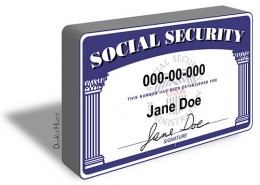Entitled to Our Entitlements

This Margaret Sullivan column about whether the Times should use the world “entitlements” when referring to Social Security and Medicare benefits is fascinating.
A reader writes in to argue that these benefits aren’t entitlements at all, rather something we pay for through payroll withholding throughout the course of our working lives, and the Times should stop referring to them as such. Sullivan has an on-staff economist weigh in, and he points out that while “entitlements” is a vague and un-ideal word, it isn’t true that most Americans “pay for” their future Social Security and Medicare benefits:
It’s simply not the case that most people pay for their Medicare benefits. They pay for only a small portion of them. The gap between what the average person pays in Medicare taxes and receives in Medicare benefits is in fact the largest single source of the country’s long-term fiscal problems.
Margaret Sullivan finally gives us her take:
“Entitlements” has become a politically charged term that many interpret as having a sneering tone. That’s unintentional in most uses in The Times, I’m sure. But as I’ve noted before, in discussions of words such as “detainee” and “torture,” word choice matters.
Since the negative meaning is very likely not intended, it would be better — as Mr. Leonhardt suggests — to use the words “federal retirement benefits.” That’s longer and a bit clunky, which is never a virtue in a newspaper article, but it has the benefit of being more neutral.
On a language level I love this. Being “entitled” to something technically means you have a legal right to it, which is exactly the case here, but the word does have such an awful, opposite connotation. When we call people “entitled” we usually mean that they are behaving as if they have a right to something that they don’t. Even the phrase, “I just want what I am entitled to,” has a dickish, presumptive connotation (at least to me). When someone invokes entitlement, my first reaction is, “Oh really?” Or maybe it’s not the connotation at all, maybe it’s just that we hate people asserting their rights to things that we don’t want to give them. It’s such a weird word, and I agree best avoided.
Photo: Donkey Hotey
Support The Billfold
The Billfold continues to exist thanks to support from our readers. Help us continue to do our work by making a monthly pledge on Patreon or a one-time-only contribution through PayPal.
Comments